In my May 18 post, I opened with a few words about my Loretto artist residency. I continue to reflect on what I gained from my time there, not just the many words written and revised, but also the way the place itself connects with the overarching theme of this Substack—rural life. With that in mind, I decided to take the floor screen this week and share some reflections inspired by my stay.
1. Peace and quiet
At Loretto, I stayed in the 1-room Valley House. It is surrounded by fields, not far from a creek on one side, a cemetery on another. While I was there, my Merlin app picked up no fewer than 25 different birds by sound, and I spotted several others on my own, no device required. I watched a turtle amble across the little yard, stopping every so often for a snack, then laughed as young squirrels frolicked in the nearby copse of trees.
I quickly adapted to my quiet life in the little house.1 I knew I would be on my own a lot, and so had updated my writing playlist and brought my Bluetooth speaker. I never once turned the speaker on, content with the sounds of my surroundings and the ebb and flow of thoughts in my head. I live in the country and things are usually pretty calm here, but somehow the tranquility of the Loretto grounds had a different quality.
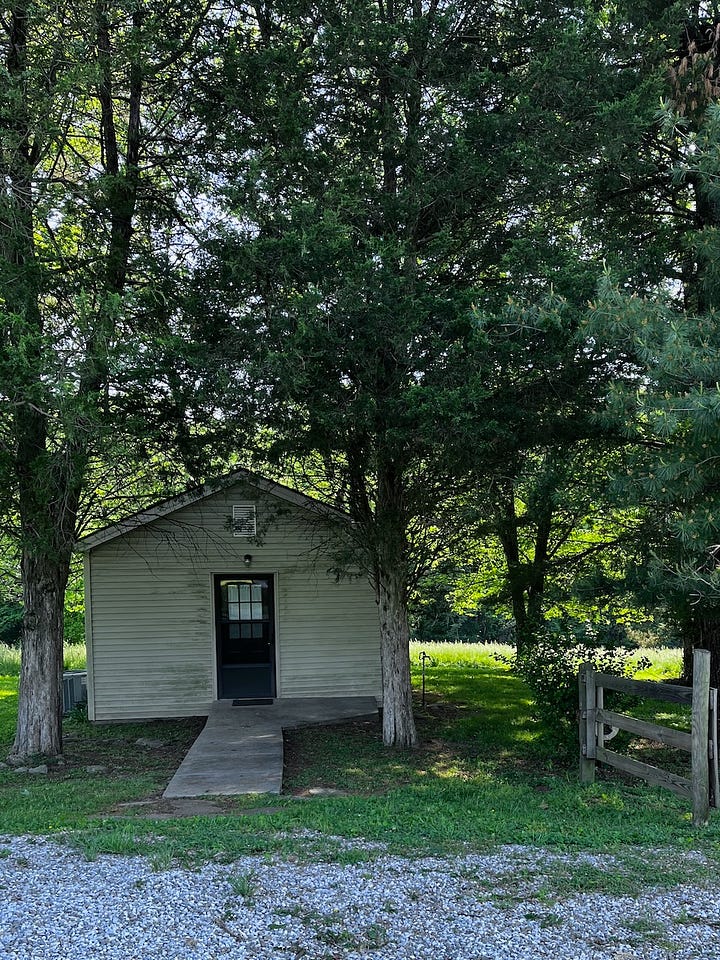
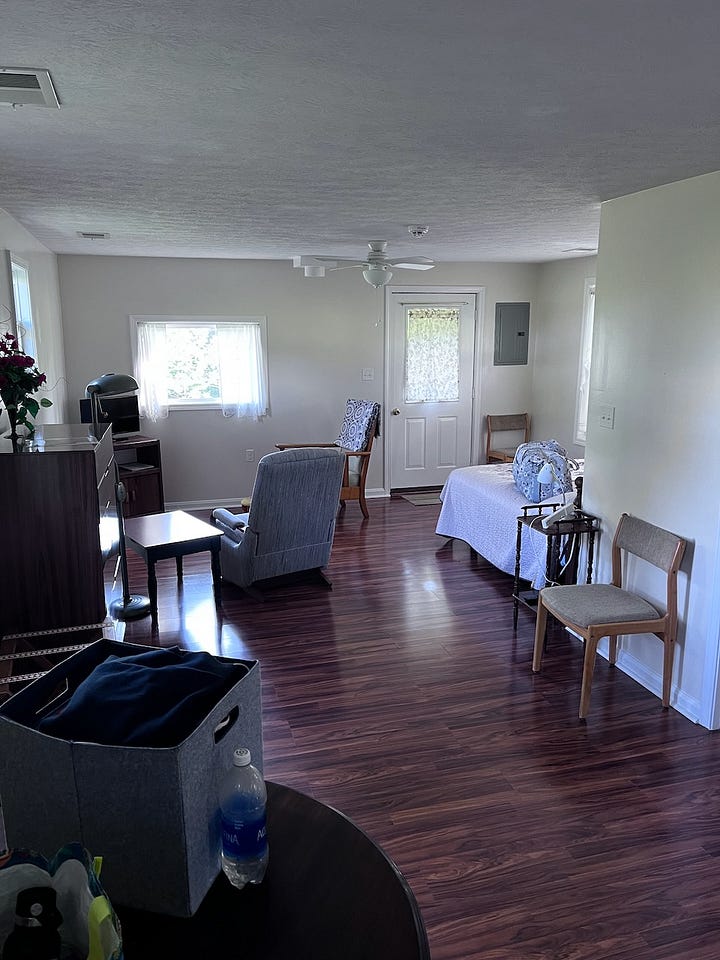
2. Water
One of my very favorite parts of being at Loretto was the opportunity to spend time beside various bodies of water. I usually went in the mornings or evenings, sometimes both. The creek would sing, as creeks are wont to do, while the lakes and ponds tended to be perfectly still save the occasional splash of turtles. Joseph’s Lake especially had an abundance of shelled friends, not to mention one of the loudest bullfrogs I’ve ever heard.
My big writing project involves floods, so I spend a lot of time thinking about water and its contradictions. Not that water knows it has contradictions, of course—water does what water will. We humans are the ones who struggle. We love its “natural” beauty yet seek to control and contain it, shaping it to our own desires rather than the other way around, which causes us no end of pain and grief. Although it rained most days while I was at Loretto, the rain was not of the scary kind. In fact, the second verse of Psalm 23 often took on embodied form as I found solace and inspiration on the shores of lakes and ponds.
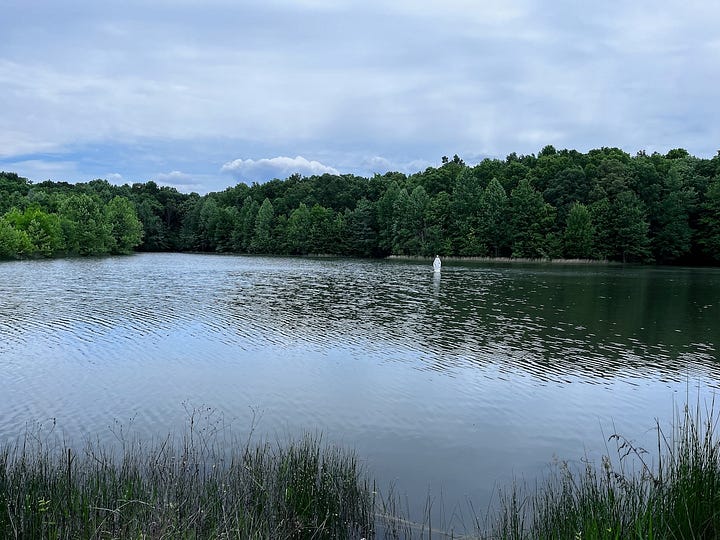
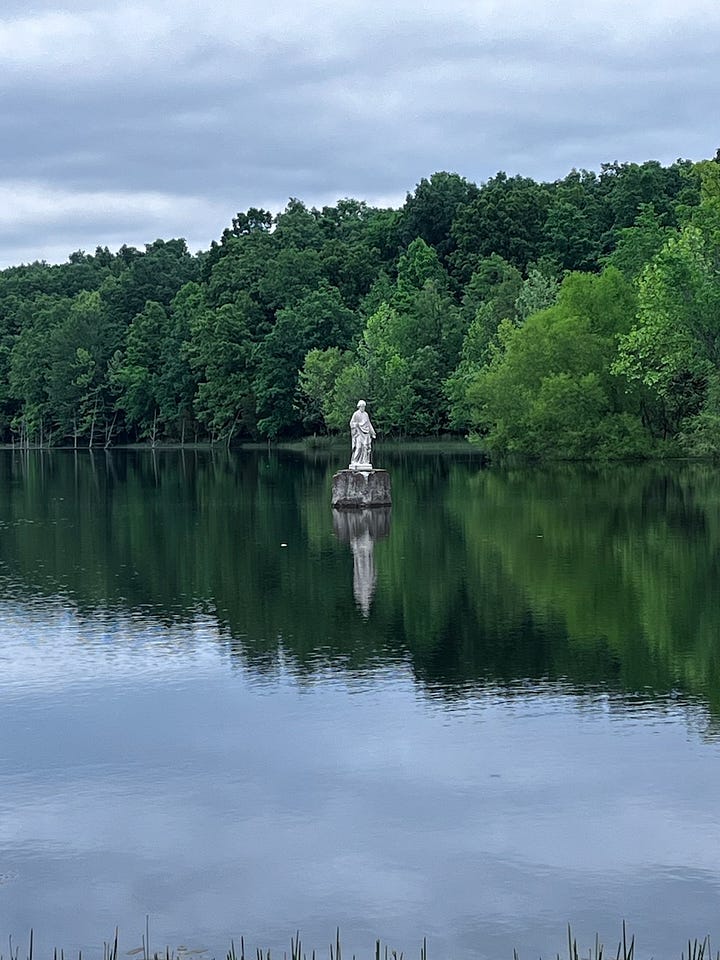
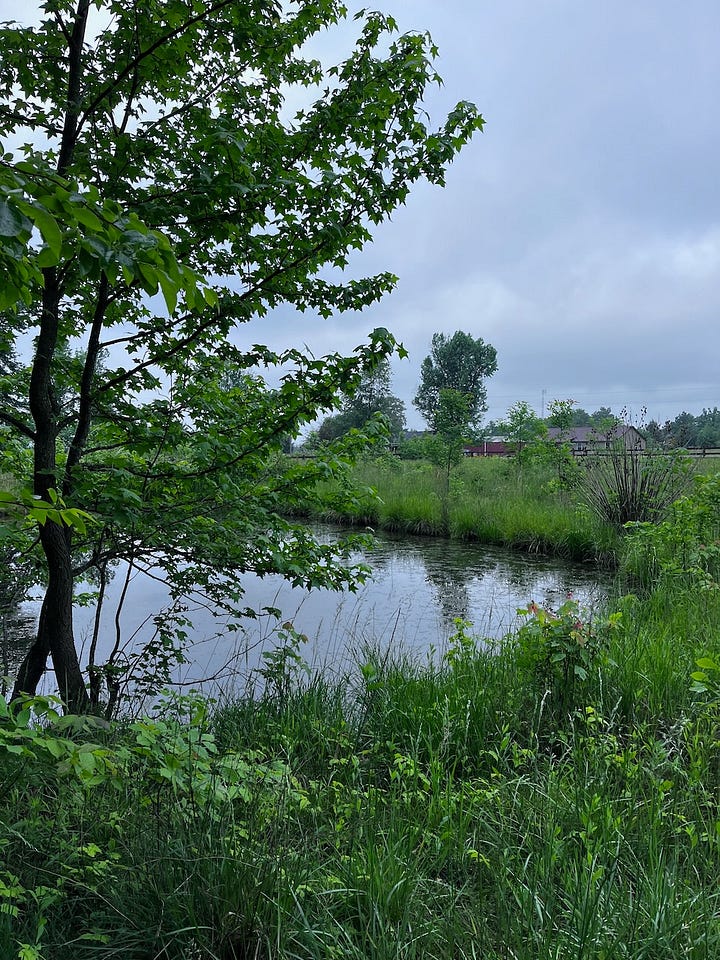
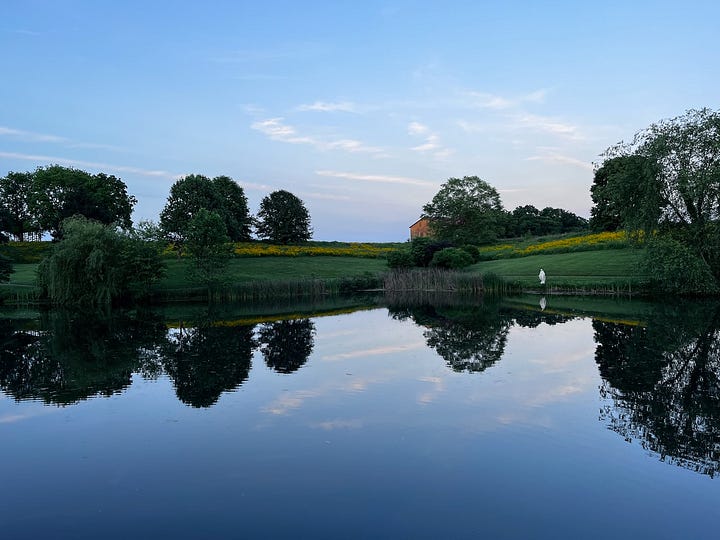
3. Cows
When I arrived, Eleanor, the Sister who showed me around, said I was lucky they had just moved the cows. The fields around the Valley House serve as pasture for the Loretto Motherhouse Farm’s herd of grass-finished beef cattle, which means one can have them quite literally in one’s back yard. Having grown up on a cattle farm, I was entirely unfazed by this, though it occurred to me that as artists in residence go, I may have been the exception rather than the rule.
“Oh, you’re off with the cows,” became an oft-repeated refrain throughout my stay. I would tell the Sister in question no, the cows had been rotated to a different pasture, then add that I would have been fine if the cows had been there, that I’d grown up around cattle and that they occupied part of current reality as well. A neighbor just two doors up has a small herd, while a much larger one sometimes grazes a pasture just across our dead-end road.
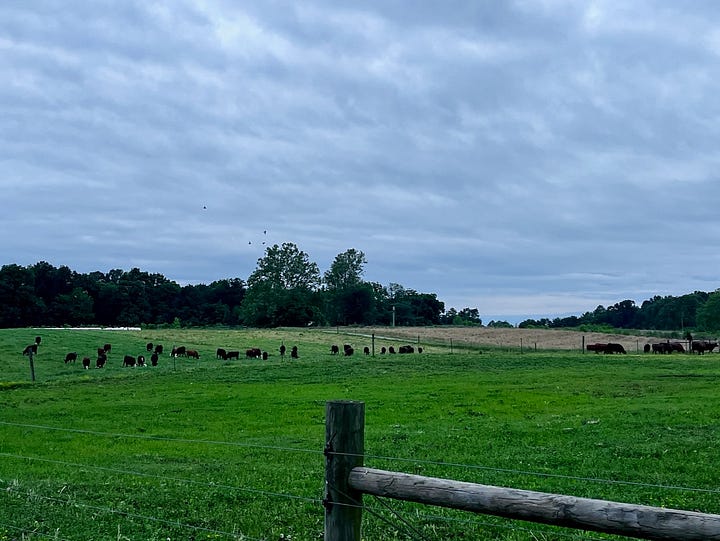
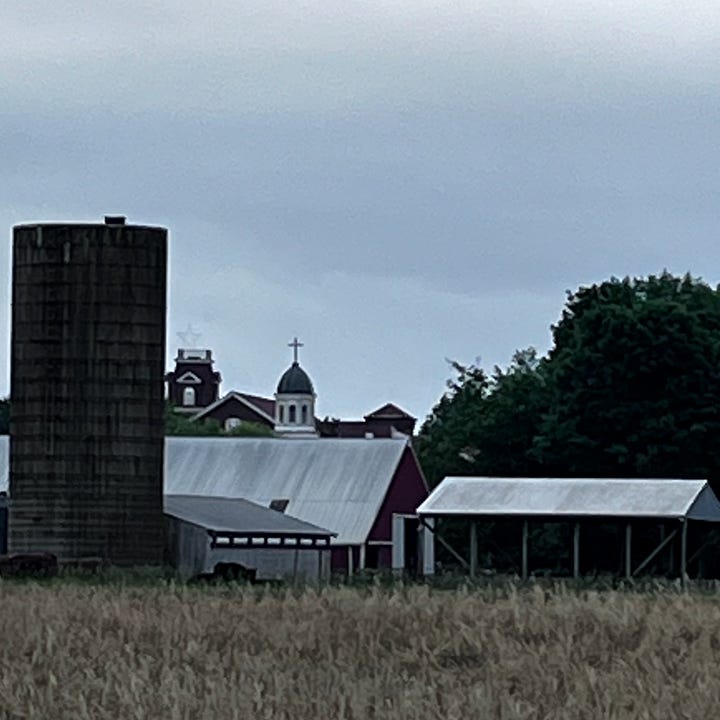
4. Cows? At a convent?
Yep. Grass-finished beef is part of a larger vision for balanced land use at the Loretto Motherhouse property. This includes not just the Motherhouse and its associated buildings, but also regenerative agriculture, hardwood forest preservation and restoration, wildlife corridors, pollinator habitats, even green burial. According to their website:
“Three goals guide the work of the Motherhouse through its Farm and Land Committee: to protect undisturbed spaces, to regenerate degraded spaces, and to mitigate and reduce carbon emissions.”
These are not just words—when you walk around the property, you see these principles in action. What’s more, the Loretto Motherhouse Farm also serves as a demonstration farm where others can come to learn. All too often, agriculture and environmentalism are seen as two opposing forces in a zero-sum game. Places like Loretto affirm what I experienced growing up—a both-and world where those who grow our food care deeply for the water and the land.
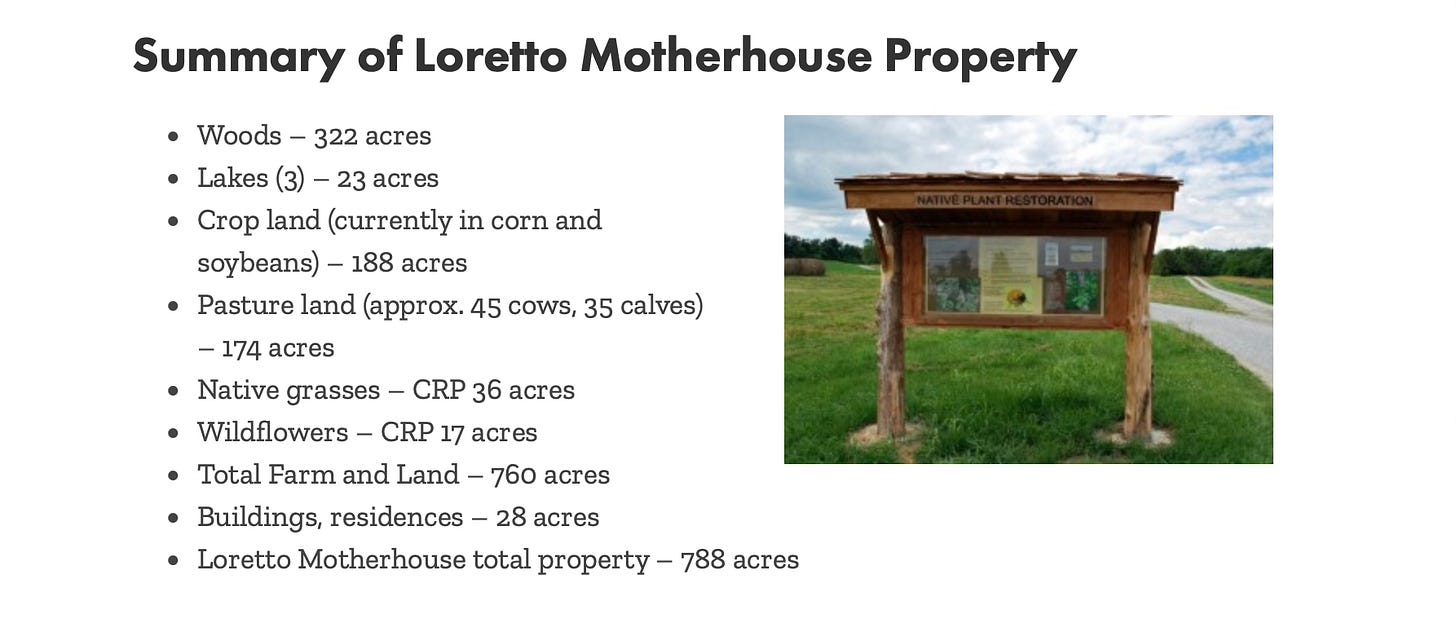
5. The sanctity of all life
Last fall, I reviewed an essay collection entitled Appalachian Ecocriticism and the Paradox of Place for Still: The Journal that explained how the way we treat other people, especially those we label as “other,” often reflects the way we treat other creatures as well as the rest of the “natural” world.2 When we see ourselves as separate, it becomes easier to see those lives as less important, maybe even devoid of value.
The converse is also true—if we care for the more-than-human world, this can and should find itself mirrored in the way we treat other people, regardless of social class, gender, sexuality, race, and regional or national origin. This shines through in the Loretto community as well. As a professor of world languages and cultures, the injunction to “welcome the stranger” lies at the heart of everything I do; when I drove up and saw this sign, I suspected I would feel right at home.
I did.
If you’ve stuck with me this far, thank you. I know not everyone will agree with everything I’ve written, and I’m okay with that. I just wanted to follow in my grandmother’s footsteps and share some things about rural life that have been on my mind.
I wanted to write “silent” life, but “silent” would be inaccurate —the birds; the tractors, dogs, and roosters on nearby farms; the occasional car crunching down the gravel road, all that was anything but silent!
The collection eloquently and convincingly challenges the separation between “natural” and “human,” but that’s an essay for another time.





Laura: Thank you for today's offering of "Rural Reflections." I especially loved your thoughts about water: "My big writing project involves floods, so I spend a lot of time thinking about water and its contradictions. Not that water knows it has contradictions, of course—water does what water will. We humans are the ones who struggle. We love its 'natural' beauty yet seek to control and contain it, shaping it to our own desires rather than the other way around, which causes us no end of pain and grief." True, wise words. Your musings about the ways in which our treatment of animals may be connected to our treatment of people we view as "other" also resonated strongly with me. Beautiful thoughts all. Thank you again.
so glad to read about your experience at Loretto (and thanks for the Still: The Journal link!)